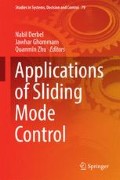Abstract
Harmonic disturbance rejection is an important field of control theory and applications. In this paper a discrete first and second order sliding mode control for multivariable systems are investigated. The necessary conditions of harmonic disturbances rejection using first and second order sliding mode control laws are elaborated. In order to improve the performances of sliding mode control in periodic disturbances rejection, a discrete repetitive sliding mode control is presented. A necessary condition for the choice of the discontinuous terms in discrete repetitive sliding mode control is then developed. The different proposed control strategies have been tested on numerical simulation example. The obtained results are very satisfactory in terms of compensation of periodic disturbances using discrete repetitive sliding mode control.
Access this chapter
Tax calculation will be finalised at checkout
Purchases are for personal use only
References
Arimoto, S., Kawamura, S., & Miyazaki, F. (1984). Bettering operation of dynamic systems by learning: a new control theory for servomechanism or mechatronics systems. Proceedings of the 23rd Conference on Decision and Control, pp. 1064–1069.
Bandyopadhyay, B., & Fulwani, D. (2009). High-performance tracking controller for discrete plant using nonlinear sliding surface. IEEE Transactions on Indusrial Electronics, 56(9), 3628–3637.
Bartoszewicz, A. (1998). Discrete-time quasi-sliding-mode control strategies. IEEE Transactions on Industrial Electronics, 45(4), 633–637.
Bartoszewicz, A., & Lesniewski, P. (2014). Reaching law approach to the sliding mode control of periodic review inventory systems. IEEE Transactions on Automation Science and Engineering, 11(3), 810–817.
Castillo-Toledoa, B., Gennaro, S. D., Loukianov, A. G., & Rivera, J. (2008). Discrete time sliding mode control with application to induction motors. Automatica, 44, 3036–3045.
Cavallo, A., & Natale, C. (2004). High-order sliding control of mechanical systems: theory and experiments. Automatica, 12, 1139–1149.
Chan, C. Y. (1997). Discrete-time adaptive sliding mode control of a linear system in statespace form. International Journal of Control, 67(6), 859–868.
Chang, J. L. (2002). Discrete sliding-mode control of mimo linear systems. Asian Journal of Control, 4(2), 217–222.
Chang, J. L., & Chen, Y. P. (2000). Sliding vector design based on the pole assignment method. Asian Journal of Control, 2, 10–15.
Chang, K., Shim, I., & Park, G. (2006). Adaptive repetitive control for an eccentricity compensation of optical disk drivers. IEEE Transactions on Consumer Electronics, 52(2), 445–450.
Dehri, K., Ltaief, M., & Nouri, A.S. (2011). New discrete multivariable sliding mode control for multi-periodic disturbances rejection. Proceedings of the International Multi-Conference on Systems, Signals and Devices, Tunisia.
Dehri, K., Ltaief, M., Nouri, A. S. (2012a). Repetitive sliding mode control for nondecouplable systems: periodic disturbances rejection. Proceedings of the 20th Mediterranean Conference on Control and Automation, MED’12, July 3–6, Barcelona, Spain.
Dehri, K., Ltaief, M., & Nouri, A. S. (2012b). New discrete sliding mode control for nonlinear multivariable systems: multi-periodic disturbances rejection and stability analysis. International Journal of Control Science and Engineering, 2(2), 7–15.
Doh, T.Y., & Ryoo, J.R. (2006). Robust stability condition of repetitive control systems and analysis on steady-state tracking errors. Proceedings of the International Joint Conference on SICE-ICASE, pp. 5169–5174.
Fateha, M. M., Tehranib, H. A., & Karbassic, S. M. (2013). Repetitive control of electrically driven robot manipulators. International Journal of Systems Science, 44(4), 775–785.
Francis, B., & Wonham, W. (1976). The internal model principle of control theory. Automatica, 12(5), 457–465.
Gao, W., Wang, Y., & Homaifa, A. (1995). Discrete-time variable structure control systems. IEEE Transactions on Industrial Electronics, 42(2), 117–122.
Ginhoux, R. (2003). Compensation des mouvements physiologiques en chirurgie robotisée par commande prédictive. PhD thesis, Université Louis Pasteur Strasbourg.
Lopez, P., & Nouri, A.S. (2006). Théorie élémentaire et pratique de la commande par les régimes glissants. Berlin: Springer.
Mihoub, M., Nouri, A.S., Abdennour, R.B. (2009). Real-time application of discrete second order sliding mode control to a chemical reactor. Control Engineering Practice, 17(9), 1089–1095.
Mihoub, M., Nouri, A.S., & Abdennour, R.B. (2011). Multimodel discrete second order sliding mode control: stability analysis and real time application on a chemical reactor pp. 473–490. In Tech.
Monsees, G. (2002). Discrete-time sliding mode control. PHD Thesis, University of Gabes, Tunisia.
Romdhane, H., Dehri, K., & Nouri, A. S. (2015). Second order sliding mode control for discrete decouplable multivariable systems via input-output models. International Journal of Automation and Computing, 12(6), 630–638.
Sarpturk, S. Z., Istefanopulos, Y., & Kaynak, O. (1987). On the stability of discrete-time sliding mode control systems. IEEE Transactions on Automatic Control, 32, 930–932.
Stoica, C. N. (2008). Robustification de lois de commande prédictives multivariables. Thesis.
Xuan, S. M., Xiong, H. X., & Yu, C. B. (2007). Repetitive Learning Control for Time-varying Robotic Systems: A Hybrid Learning Scheme. Automatica, 33(11), 1189–1195.
Xuan, S. M., Jiang, Y. L., & Gang, H. H. (2013). Discrete Adaptive Repetitive Control: Convergence Analysis and Implementation. Acta Automatica Sinica, 39(4), 400–7406.
Yan, T. H., He, B., Chen, X. D., & Xu, X. S. (2013). The discrete-time sliding mode control with computation time delay for repeatable run-out compensation of hard disk drives. Mathematical Problems in Engineering, 2013(2), 1–13.
Young, K. D., Utkin, V. I., & Ozguner, U. (1999). A control engineer’s guide to sliding mode control. IEEE Transactions on Control Systems Technology, 7(3), 328–342.
Yu, X., & Kaynak, O. (2009). Sliding mode control with soft computing: a survey. IEEE Transactions on Industrial Electronics, 56(9).
Zhou, K., & Wang, D. (2003). Digital repetitive controlled three-phase PWM rectifier. IEEE Transactions on Power Electronics, 18(1), 309–316.
Acknowledgments
This work has been supported by the Ministry of the Higher Education and Scientific Research in Tunisia.
Author information
Authors and Affiliations
Corresponding author
Editor information
Editors and Affiliations
Rights and permissions
Copyright information
© 2017 Springer Science+Business Media Singapore
About this chapter
Cite this chapter
Dehri, K., Ltaief, M., Nouri, A.S. (2017). Conditions of Disturbances Rejection for Discrete First, Second Order and Repetitive Sliding Mode Controllers. In: Derbel, N., Ghommam, J., Zhu, Q. (eds) Applications of Sliding Mode Control. Studies in Systems, Decision and Control, vol 79. Springer, Singapore. https://doi.org/10.1007/978-981-10-2374-3_2
Download citation
DOI: https://doi.org/10.1007/978-981-10-2374-3_2
Published:
Publisher Name: Springer, Singapore
Print ISBN: 978-981-10-2373-6
Online ISBN: 978-981-10-2374-3
eBook Packages: EngineeringEngineering (R0)

